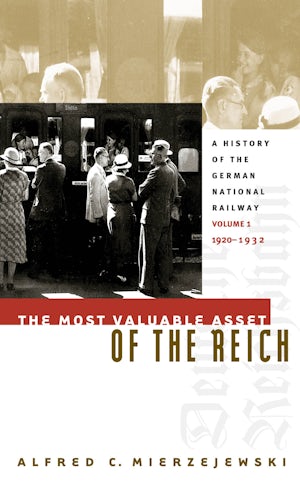The Most Valuable Asset of the Reich
A History of the German National Railway, Volume 1, 1920-1932
By Alfred C. Mierzejewski
506 pp., 6.125 x 9.25, 36 tables, 2 maps, 6 figs., notes, bibl., index
-
Paperback ISBN: 978-1-4696-1383-3
Published: November 2013 -
E-book PDF ISBN: 979-8-8908-6797-1
Published: March 2014 -
E-book EPUB ISBN: 978-1-4696-2020-6
Published: March 2014
Buy this Book
- Paperback $60.00
- E-Book $29.99
For Professors:
Free E-Exam Copies
Mierzejewski describes and analyzes the beginnings of the national railway in Germany and the problems that it faced. He examines the Reichsbahn's noncapitalistic, "commonweal" approach to economic management and shows how the railway was used to hold Germany together, especially in the face of Bavarian particularism. Mierzejewski's account also provides unparalleled insight into Germany's reparations policies, demonstrating that Germany was fully capable of paying the Dawes annuities and that the government's claims that reparations paid by the Reichsbahn hurt both the railway and Germany were groundless. A second volume will cover the period from 1933 to 1945.
About the Author
Alfred C. Mierzejewski is professor of history at the University of North Texas. He is author of The Collapse of the German War Economy, 1944-1945: Allied Air Power and the German National Railway.
For more information about Alfred C. Mierzejewski, visit
the
Author
Page.
Reviews
"In the confines of this review it is not possible to discuss critically every new argument raised in Mierzejewski's essential work. Researchers cannot ignore the arguments of either volume. For the public the hope for a carefully edited German edition is as important as it is urgent."--Historische Zeitschrift
"Mierzejewski has carved a niche for himself in this field. His reputation will be further enhanced by the publication of this first volume of a projected two-volume history of the German National Railway."--International History Review
"This impressive study combines market-oriented economic concepts with the historiographical recognition . . . 'that distinct business and economic cultures' do in fact 'exist and they can and do transcend rational economic behavior.'"--German Studies Review
"Mierzejewski's impressive command of quantitative evidence and his precise analytical narrative of the Reichbahn's history in the Weimar era makes this an indispensable contribution to a number of discussions on interwar economy and business history."--Business History Review
"Mierzejewski's two volumes on the Reichsbahn will serve as solid references and points of departure for future research on railway politics and the identities of large-scale state enterprises during the twentieth century, as well as for more extensive histories of railway technology."--Technology and Culture
"Mierzejewski is without a doubt one of the most talented German historians living today. His first book, The Collapse of the German War Economy, is one of the ten most important books about the Second World War. Now Mierzejewski takes insights gleaned from his study of German railroads and their impact on German society and moves our understanding of 20th-century German history a step further."--Virginia Quarterly Review




